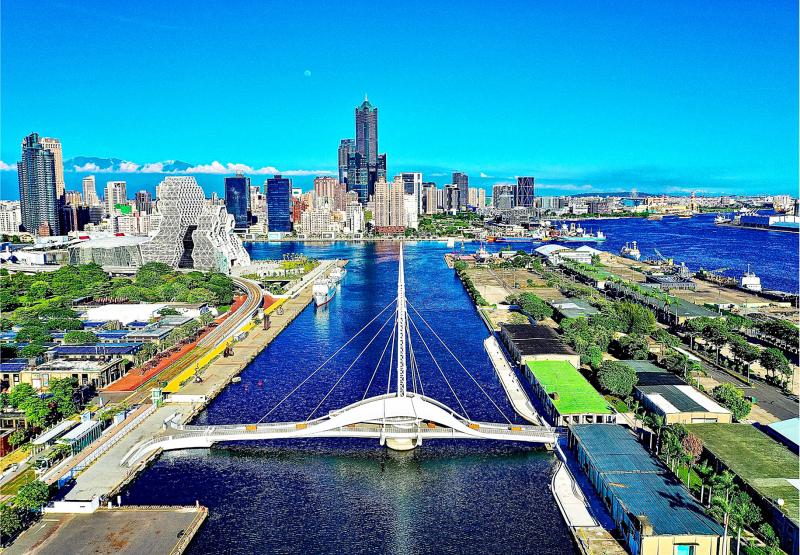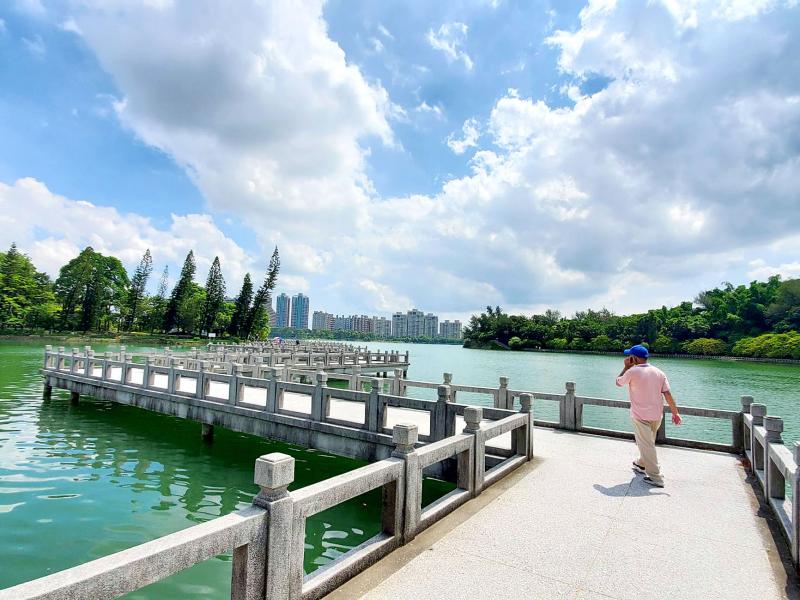Last week I was welcomed by Kaohsiung, a city of lower prices, warmer climate, friendly people and slower pace of life. These traits were brought into sharper focus thanks to a dinner chat with the kind people of the American Chamber of Commerce of Southern Taiwan.
Readers may recall that Chinese firm Shanghai Fosun Pharmaceutical Group Co (上海復星醫藥集團) demanded that the Taiwanese government hand over the health data of anyone vaccinated with its vaccines. A chamber member told me that a Chinese executive in Johnson & Johnson inserted the same demand in its contract. Of course the Taiwanese government had to refuse.
Yes, there was an effort, coordinated from Beijing, in part using Chinese executives in western firms, to stop Taiwan from acquiring vaccines. This episode illuminates who those executives answer to. It should be obvious that Beijing not only can coordinate their actions, but that any information about the firm such an executive has access to, Beijing already has.

Photo courtesy of the Kaohsiung City Government
FUTURE PLANS
Brian Aiello, President of Southern Taiwan AmCham, spoke to me at length about AmCham’s programs and plans, as well as the problems Kaohsiung faces. The Taipei Chamber, he observes, is more focused on the national level. The southern chamber, by contrast, is resolutely local.
Kaohsiung, he said, has a lower level of internationalization than Taipei or Taichung.

Photo: Chen Wen-chan, Taipei Times
“In Taiwan,” he said, “there are many traditions that still hold strong. This is sometimes inhibiting.”
Businesses in southern Taiwan often create products and then focus narrowly on one market, when there might be a number of other applications for them.
Another problem Kaohsiung faces is that it is viewed as a poor destination for young talent. He said that AmCham is attempting to attack this problem via internship programs.
One concern is that, compared to other major cities, Kaohsiung has a lower level of English. The city has a Bilingual Commission that has periodic meetings, which AmCham participates in. They advise the government on decisions such as what to name things in English. It also has an education center that it uses for events and speeches.
The chamber is also trying to get “landmark industries” to move into the city. Such industries might include environmental firms that work on solar-related projects that have high export potential. One of its long-term goals is to get people to return to Taiwan, to get them to consider coming back to good jobs with decent pay and a comfortable lifestyle.
The city, he pointed out, already has a solid base of firms with world-class technologies. In the health field alone, he gave several examples. One local company has developed a disinfectant spray that kills 99 percent of germs, including COVID-19, yet is not toxic to humans and has no strong smell. Anyone who has ever endured the stench left by someone spraying down his seat in closed train carriage with alcohol spray would surely welcome that.
A local company has also developed a 10-minute, highly accurate test for COVID-19. Another interesting technology Aiello instanced was a hydrogen-based therapy already licensed in Japan where doctors are using it to attack cancer and other diseases.
Clearly the basis for growth is present. AmCham is working on speeding up the approval process and generating more government support for new products and technologies.
One advantage the city has is land, he said. After the heavy industries left 20 or 30 years ago, the government sat on large tracts of land, letting it rest. Unfortunately, the city has struggled to attract new businesses ever since.
WHITE PAPER
Aiello has written most of the organization’s recent White Papers.
“We don’t include every problem in our White papers, and we don’t point fingers,” he said.
Instead, he described, AmCham’s white papers focus on problems for which they can propose solutions.
In 2011 Aiello was a member of Taiwan’s APEC (Asia-Pacific Economic Cooperation) delegation to the meeting in Montana that year. During the meeting a White House official drew him aside and asked for a couple of copies of the White Paper. They would be, he was assured, read by then-president Barack Obama.
Another issue Southern Taiwan AmCham is working on is supply chain security. A number of firms are thinking of following the Taiwan Semiconductor Manufacturing Co (TSMC, 台積電) model of building factories in countries that are important markets. AmCham helps them research US state and local incentives for relocating factories to the US.
“We try to create situations where you have mutual benefit,” he said. “We try to get involved with all levels: What is the government perspective? What is the local business perspective? What is the perspective of the local population?”
Several years ago the chamber opened its doors to local firms, which has helped it to understand local perspectives and situations much better.
Aiello also added that the changing international climate is shaping their activities. The US has become more pro-active in its support for Taiwan, he observed. Given Japan’s recent and very public turn to Taiwan, if they can include Japan in what they are doing, they consider that a win-win. Not only is that good for Taiwan’s security, it also helps the economies of all three countries.
Southern Taiwan AmCham covers the counties of Penghu, Yunlin, Chiayi, Pingtung and Taitung, and the municipalities of Tainan and Kaohsiung. The organization has plans to set up offices in each, to deal directly with local governments and local businesses.
Though the energetic and engaging Aiello has already reached an age at which most people would be retiring, he plans to continue his involvement with the world around him.
“I really want to make a difference,” he says. “My position at AmCham has always been as an unpaid volunteer. The way I see it, it is my way of creating a secure and robust continuing relationship between Taiwan, my home for about a third of my life, and the US, which I will always support.”
Notes from Central Taiwan is a column written by long-term resident Michael Turton, who provides incisive commentary informed by three decades of living in and writing about his adoptive country. The views expressed here are his own.

This is the year that the demographic crisis will begin to impact people’s lives. This will create pressures on treatment and hiring of foreigners. Regardless of whatever technological breakthroughs happen, the real value will come from digesting and productively applying existing technologies in new and creative ways. INTRODUCING BASIC SERVICES BREAKDOWNS At some point soon, we will begin to witness a breakdown in basic services. Initially, it will be limited and sporadic, but the frequency and newsworthiness of the incidents will only continue to accelerate dramatically in the coming years. Here in central Taiwan, many basic services are severely understaffed, and

Jan. 5 to Jan. 11 Of the more than 3,000km of sugar railway that once criss-crossed central and southern Taiwan, just 16.1km remain in operation today. By the time Dafydd Fell began photographing the network in earnest in 1994, it was already well past its heyday. The system had been significantly cut back, leaving behind abandoned stations, rusting rolling stock and crumbling facilities. This reduction continued during the five years of his documentation, adding urgency to his task. As passenger services had already ceased by then, Fell had to wait for the sugarcane harvest season each year, which typically ran from

It is a soulful folk song, filled with feeling and history: A love-stricken young man tells God about his hopes and dreams of happiness. Generations of Uighurs, the Turkic ethnic minority in China’s Xinjiang region, have played it at parties and weddings. But today, if they download it, play it or share it online, they risk ending up in prison. Besh pede, a popular Uighur folk ballad, is among dozens of Uighur-language songs that have been deemed “problematic” by Xinjiang authorities, according to a recording of a meeting held by police and other local officials in the historic city of Kashgar in

It’s a good thing that 2025 is over. Yes, I fully expect we will look back on the year with nostalgia, once we have experienced this year and 2027. Traditionally at New Years much discourse is devoted to discussing what happened the previous year. Let’s have a look at what didn’t happen. Many bad things did not happen. The People’s Republic of China (PRC) did not attack Taiwan. We didn’t have a massive, destructive earthquake or drought. We didn’t have a major human pandemic. No widespread unemployment or other destructive social events. Nothing serious was done about Taiwan’s swelling birth rate catastrophe.